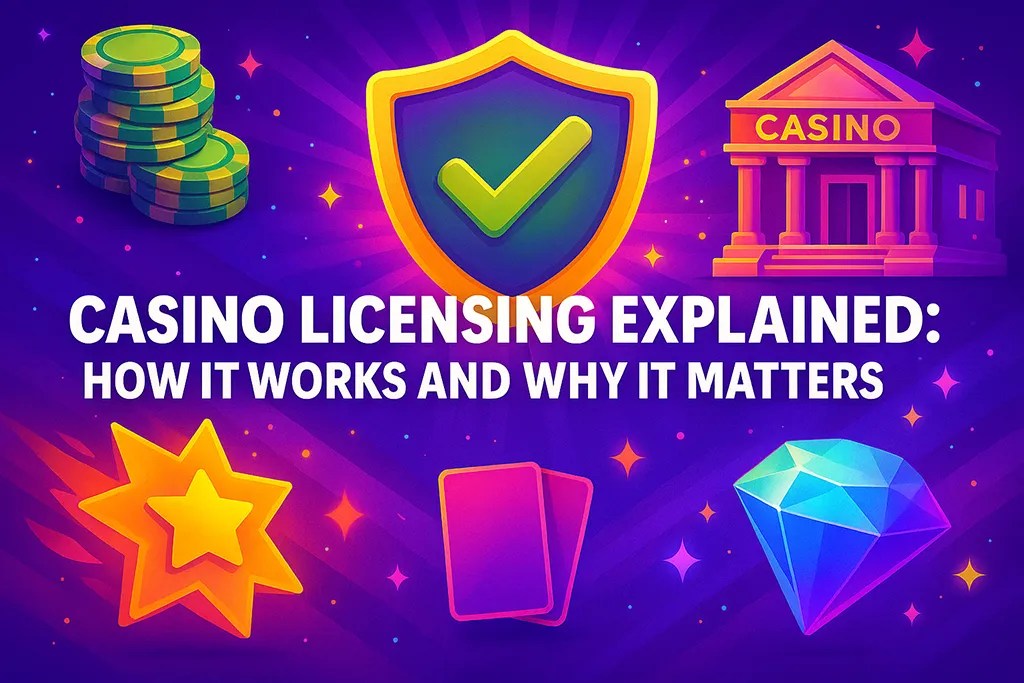The online gambling industry is booming, but with that growth comes the critical need for regulation and oversight. This is where casino licenses come in. Licensing ensures that online casinos operate fairly, securely, and transparently, protecting both the players and the integrity of the gaming industry.
Understanding how casino licensing works can help you choose safe platforms, avoid scams, and enjoy your gaming experience with peace of mind.
Casino Licensing Explained: How It Works and Why It Matters

What Is a Casino License?
A casino license is an official authorization issued by a regulatory authority that allows a company to legally offer gambling services. This license confirms that the casino has met stringent requirements covering:
- Fair gaming practices
- Secure data handling
- Responsible gambling policies
- Financial transparency
- Anti-money laundering (AML) protocols
In short, a license acts as a seal of trust between the casino and its players.
Who Issues Casino Licenses?
Casino licenses are issued by government bodies or independent regulatory authorities in jurisdictions around the world. Each jurisdiction has its own laws, standards, and processes. Some of the most well-known and reputable regulators include:
- United Kingdom Gambling Commission (UKGC)
- Malta Gaming Authority (MGA)
- Gibraltar Gambling Commissioner
- Alderney Gambling Control Commission
- Isle of Man Gambling Supervision Commission
- Curacao eGaming
- Kahnawake Gaming Commission
- Swedish Gambling Authority (Spelinspektionen)
Emerging regulators also include those in Estonia, Romania, and other EU countries, as well as offshore regulators like Panama and Costa Rica.
The Licensing Process: How Casinos Get Licensed
1. Application Submission
Casinos must submit an extensive application covering:
- Business structure
- Ownership and management details
- Financial records and solvency proof
- Software and platform specifications
- Responsible gambling policies
- Anti-fraud and AML measures
2. Background Checks
Regulators conduct background investigations into:
- The integrity of owners and key executives (criminal, financial, and ethical history)
- The casino’s funding sources
- Historical business operations
3. Software and Fairness Testing
Regulators require certification from independent testing labs (e.g., eCOGRA, iTech Labs) to verify:
- Random Number Generator (RNG) integrity
- Game fairness and return-to-player (RTP) rates
- Security protocols
4. Compliance and Auditing
Casinos must show readiness to comply with:
- AML directives
- Know Your Customer (KYC) protocols
- Data protection and privacy laws
- Advertising standards
How Often Are Casinos Checked?
- Initial Audit: Done before the license is issued.
- Regular Audits: Typically annually or biannually, depending on the jurisdiction.
- Random Checks: Regulators may conduct surprise inspections.
- Triggered Audits: If complaints arise, or if suspicious activities are detected, regulators can initiate special audits or investigations.
For instance, the UKGC and MGA have strict regular auditing and ongoing monitoring, whereas Curacao has historically been criticized for less rigorous enforcement.
Why Can a Casino Lose Its License?
A casino may be deprived of its license (revoked or suspended) for reasons such as:
- Failure to pay license fees or taxes
- Breaching AML and KYC requirements
- Rigged or unfair games
- Not protecting player funds
- Poor security or data breaches
- Allowing underage gambling
- Unethical advertising or promotions
- Persistent unresolved player complaints
Regulators like the UKGC publicly list fines, suspensions, or license cancellations, ensuring transparency.
How to Verify a Casino’s License
- Check the Casino Footer:
Legitimate casinos display license numbers and issuing authority at the bottom of their website. - Visit the Regulator’s Website:
For example: - Search the License Number:
Enter the license number to confirm the casino is listed and that the license is active. - Check the Validity and Scope:
Some casinos may list a license from a third-party company rather than the actual operator. Ensure the license covers the brand you’re playing with. - Look for Audits and Certifications:
Legitimate casinos often display certifications from testing agencies (e.g., eCOGRA).
Licensing Authorities Ranked by Reliability
Here’s a rating of the most common regulators, based on strictness, player protection, and enforcement rigor:
| Rank | Licensing Authority | Reliability/Quality Level | Notes |
| 1 | UK Gambling Commission (UKGC) | ⭐⭐⭐⭐⭐ (Very High) | World-renowned, strict audits, excellent player protection. |
| 2 | Malta Gaming Authority (MGA) | ⭐⭐⭐⭐ (High) | Highly respected, strong regulatory oversight in EU markets. |
| 3 | Gibraltar Gambling Commissioner | ⭐⭐⭐⭐ (High) | EU-recognized, robust compliance requirements. |
| 4 | Alderney Gambling Control Commission | ⭐⭐⭐⭐ (High) | Strong focus on fairness and security, lower player volume. |
| 5 | Isle of Man Gambling Supervision Commission | ⭐⭐⭐⭐ (High) | Financially robust with good reputation. |
| 6 | Swedish Gambling Authority (Spelinspektionen) | ⭐⭐⭐⭐ (High) | Strict on responsible gambling, geo-restricted to Sweden. |
| 7 | Estonian Tax and Customs Board | ⭐⭐⭐ (Medium-High) | Reliable for EU, growing market reputation. |
| 8 | Kahnawake Gaming Commission | ⭐⭐⭐ (Medium) | Solid but regional focus, mostly North America. |
| 9 | Curacao eGaming | ⭐⭐ (Low-Medium) | Popular but historically light on enforcement; better in recent years. |
| 10 | Costa Rica & Others | ⭐ (Low) | Business registration only; no real oversight or player protection. |
Why Licensing Matters for Players
- Fair Play: Guarantees that games are not rigged.
- Security: Ensures protection of your personal and financial data.
- Fund Safety: Licensed casinos must keep player funds separate from operational funds.
- Dispute Resolution: Regulators provide avenues to resolve complaints if things go wrong.
- Legal Compliance: Playing at a licensed casino keeps you within the bounds of the law in many jurisdictions.
Conclusion
Casino licensing is the backbone of the online gambling industry’s integrity. It protects players, ensures fair play, and maintains market standards. By choosing casinos regulated by top-tier authorities like the UKGC, MGA, or Gibraltar, you are safeguarding your gaming experience.
Always verify a casino’s license before playing and stay informed about the regulatory landscape to enjoy online gaming safely and responsibly.





















